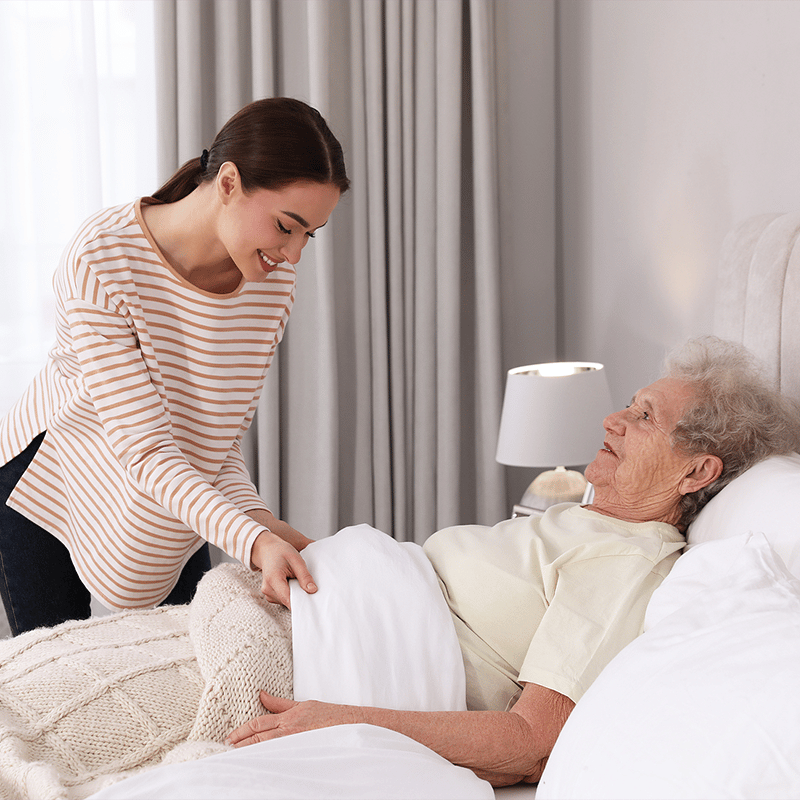Care at Home provided exemplary, professional, flexible, and timely care to my mother.
Their staff would arrive prior to the appointed time, explain the procedure, conduct care in a professional and caring manner.
They were always concerned about dignity and respect for my mom and everyone involved in my mom’s care.
I am forever thankful for the services rendered by the staff and professionals at Care at Home and will keep this on my Speed Dial as future care situations materialize.
Daniel G
I set up the nightly monitor help service with this company at a very short notice; under severe mental stress.
They always responded and followed up promptly.
The staff (as well as the owners) were nice, courteous and conscientious.
The person who actually came as the nightly aid
(to be around if something went wrong)was also punctual and nice.Fortunately, nothing went wrong, and the overall experience turned
out to be very good.Additionally, I liked the fact that they are a local small business and therefore get to know their clients closely; and
care about building a long-term relationship with their clients and are working hard to create a good reputation.Therefore, I can wholeheartedly recommend this company to others and will go back to them if i need home care help in the future.
Dan P
Care at Home is very wonderful in providing a professional service.
They are the best in taking care of seniors. The caregivers in Care at Home are responsible, dependable, and understanding.
If you need help caring for a family member, I highly recommend Care at Home.
Ivette C
If you or your loved one need around-the-clock care, you don’t necessarily need to go to an assisted living facility or nursing home. You may be able to age in place with 24-hour home care.
What is 24-hour home care? Do overnight caregivers sleep? How much does 24-hour care at home cost? Does Medicare pay for 24-hour home care?
Here’s what you need to know about 24-hour home care and how it can help keep you or your loved one at home through an illness, injury, dementia, Alzheimer’s disease, or chronic health problems.
24-hour home care is nonmedical assistance provided in the home. It can be an excellent solution to prevent seniors with dementia from wandering, to help elderly people safely get to the toilet or commode as needed throughout the night, and to keep incontinent patients clean so they don’t need to sleep in their own waste.
24-hour caregivers can provide a variety of services day or night, including:
While companionship may seem like an afterthought in the grand scheme of elderly care, it’s vitally important to the physical and mental health of seniors. The Centers for Disease Control and Prevention (CDC) says [1]:
“Loneliness and social isolation in older adults are serious public health risks affecting a significant number of people in the United States and putting them at risk for dementia and other serious medical conditions…Social isolation significantly increased a person’s risk of premature death from all causes, a risk that may rival those of smoking, obesity, and physical inactivity.”
It depends on whether you get hourly home care or live-in home care. With hourly 24-hour home care, two caregivers work 12 hours each or 3 caregivers work 8 hours each to provide care around the clock. In this case, each caregiver is being paid to stay awake for their entire shift.
If you have a live-in caregiver, you are required to give them 8 hours off every night to sleep, and you may be required to give them time off during the day, as well.

Hourly home caregivers arrive for an 8-12 hour shift and stay awake to care for you or your loved one the entire time. They then go home at the end of their shift when another caregiver arrives. Live-in caregivers get 8 hours off every night to sleep.
Each type of 24-hour care has its own pros and cons.
While live-in home care is cheaper than hourly home care and you or your loved one get to know fewer caregivers, somebody else (including a loved one) must able to provide care for the patient while the live-in caregiver sleeps each night.
Hourly home care is more expensive and more caregivers will come to your home, but there will always be somebody awake and available to assist you or your loved one.

In-home elderly care costs vary widely across the country [2]. For 24-hour care, you could expect to pay an average of $23,295 per month for a home health aide in California, $24,387 in Colorado, $17,472 in Texas, $14,196 in Lousiana, $14,559 in Mississippi, or $21,111 in New York State. The national monthly median cost for 24-hour care is $19,656.
24-hour home care can be an excellent solution to prevent seniors with dementia from wandering, help elderly people safely get to the toilet throughout the night, and keep incontinent patients clean.
If you have been caring for your loved one yourself or if they have been getting by with part-time in-home care, it can be hard to know when it’s time to transition them to 24-hour care. Here are some ways to figure out whether a senior needs full-time home care:
It may seem overwhelming to try to find the best around-the-clock care for your loved one. As you research various agencies, here are some questions you can ask to help you identify the best place to meet your needs [4]:
Searching for the right 24-hour home care agency? Let us help.
Licensed as a Residential Service Agency (RSA) by Maryland Department of Health and Mental Hygiene, Office of Health Care Quality. State License Number R4621.
Serving Anne Arundel County, Baltimore County, Howard County, Prince George’s County & Montgomery County.
